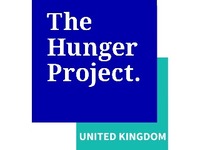Create your page
It takes just a few steps to create your page supporting The Hunger Project UK.

Raising for The Hunger Project UK
Situation
Bangladesh ranks seventh on the list of countries most vulnerable in the world to climate change-induced natural disasters. It has been estimated by the IPCC's reports and analysis that a one meter sea level rise in the south of the country, could mean that Bangladesh will lose up to 20% of its current landmass. According to the Bangladeshi Government’s National Strategy Paper, it is estimated that Bangladesh will produce 25 million climate refugees when they lose this land to the sea.
Solution
The Hunger Project Bangladesh's SDG Union Strategy calls for a partnership between: (1) the people, (2) their elected representatives at the local level, (3) a civil society created from the ground up, and (4) the government functionaries responsible for delivering services to grassroots communities. They aim to achieve the SDGs and build localised community knowledge on climate vulnerabilities and opportunities. We want to provide further training and support to these established Unions.
Campaign Aims
To change the mindset of the communities to believe they can achieve the SDGs, through the Community Learning and Development (CLD) process. This involves running village-based Youth Unit coordination meetings, Volunteer Forums and Capacity Building Training for members of the community.
To take urgent action to mitigate climate change and its impact, by developing the Climate Change Resilient Villages (CCRV) Model as the solution. The CCRV model prepares communities to be active participants and leaders in climate resilience.
To promote peaceful and inclusive societies for sustainable development and build effective, accountable and inclusive institutions at all levels. We will do this by implementing various capacity-building programmes for local individuals, government officials and elected local representatives.
To contribute to increasing climate-adaptive livelihood and nature-based solutions in the community, and increase Local Government Institutions investment in climate-resilient actions.
To build and strengthen community knowledge systems related to climate change, natural disasters, nature-based solutions, and emergency services. These systems will also collect, document, and analyze data about losses caused by disasters associated with natural hazards.
Campaign Budget
£25 could support a volunteer leader in South Asia to attend a leadership development training. During these trainings, volunteer leaders — called Animators — learn how to strengthen civil society, laying the groundwork for communities to thrive and coordinating efforts on the ground.
£100 could support a volunteer leader in Africa to attend a food security and agriculture training. Food Security and Agriculture volunteers — called Animators — learn effective farming techniques that include creating climate smart (resilient) soil and water conservation and storage techniques to reduce malnutrition in communities. These Animators in turn train their neighbours, building food security for entire communities.
£105 could support a woman’s participation in a multi-day Women Leadership Training in South Asia. Women attend these residential trainings alongside other empowered women in their region to learn and explore ways they can take leading roles in the development of their communities. Together, they develop plans for income opportunities, decision making strategies, political engagement and more.
£1,250 – Support 25 volunteers to receive a Climate Friendly Entrepreneur Development Training.
Photo The Hunger Project-Bangladesh, 2022
It takes just a few steps to create your page supporting The Hunger Project UK.
Share across your social media channels to encourage donations.
Collect donations on your page including Gift Aid where eligible.
Charity number: 1164839
Ending hunger starts with people.
Resilience. Courage. Ingenuity. Creativity. People are extraordinary. With your support, The Hunger Project works with communities to realise their own future, free from hunger and poverty.
The Hunger Project has a more than 40-year track record of standing in partnership with people living in poverty as they work to end their own chronic hunger.
Our vision is a world without hunger. Our mission is to facilitate individual and collective action to transform the systems of inequity that create hunger and cause it to persist. We do this by pioneering sustainable, grassroots, women-centred strategies and advocating for their widespread adoption in countries across rural Africa, South Asia and Latin America.
The issues.
783 million people are chronically undernourished. That’s 1 in 10 people living in hunger and poverty. Unlike famines that receive emergency-aid, chronic hunger is a silent, invisible, day-after-day condition. Millions live with hunger and undernourishment because they simply cannot afford to buy enough food, cannot afford nutritious foods or cannot afford the farming supplies they need to grow enough good food of their own.
Our approach.
Top-down, aid-driven, ‘West knows best’ models fail to create sustainable, lasting change for communities living in hunger and poverty. At The Hunger Project we’re breaking the cycle of hunger and poverty, by flipping this model on its head. We believe hungry people themselves are the key to ending hunger and we have 40+ years of evidence to say this theory of change works. Our programmes are based on an innovative, holistic approach that empowers people with the skills, knowledge and resources they need to break the poverty cycle themselves and ending hunger sustainably.
As we adapt to meet local challenges and opportunities wherever we work, our programmes have a wide range of objectives such as empowering women, improving maternal health, engaging local governments, supporting small holder farmers on climate resilience, educating girls and ending child marriage.
Our impact.
In 2024, The Hunger Project’s work reached over 12.8 million people. There are currently 1.3 million people living in 85 self-reliant epicentre communities in Africa, thanks to our work.
Our work in the UK
For us in the United Kingdom, we think there is more to life than just consuming. We are all connected and honouring that connection through partnership makes life richer. We all have a part to play in the end of hunger. We believe passionately that ending hunger is possible, and that our generation has the power to end it once and for all.